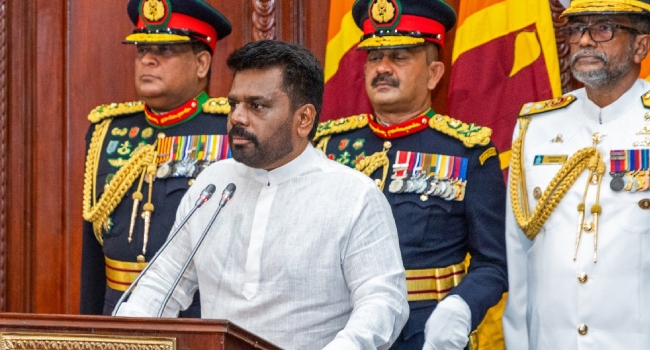Sri Lanka’s newly elected leftist president dissolved parliament on Tuesday and called for early elections as he prepares to renegotiate the country’s contentious International Monetary Fund (IMF) bailout.
Anura Kumara Dissanayake, a self-declared Marxist and leader of the People’s Liberation Front (JVP), took office on Monday following a landslide victory in the weekend’s presidential election. On Tuesday, he dissolved the 225-member parliament, where his previously marginal party held just three seats, and scheduled elections for November 14—nearly a year ahead of the original date, according to a notice in the official government gazette.
The order to dissolve parliament, originally set to conclude its term in August, took immediate effect.
Dissanayake’s rise in popularity stems from his party’s response to the 2022 economic crisis, which left millions of Sri Lankans in hardship and led to the implementation of a highly unpopular IMF bailout plan. Despite his party’s historically small presence in the legislature, support surged as the public became disillusioned with the political establishment.
Earlier on Tuesday, the president appointed Harini Amarasuriya, a 54-year-old lawmaker and sociology lecturer, as the new prime minister. Amarasuriya, known for her advocacy on gender equality and minority rights, will also oversee the portfolios of justice, education, health, women’s affairs, and labor. Another JVP member, Vijitha Herath, was appointed foreign minister with additional responsibility for public security. Dissanayake retained control over the defence, energy, and agriculture ministries.
The JVP intends to maintain a small cabinet, with ministers sharing responsibilities. “This will be the smallest cabinet in Sri Lanka’s history,” said party member Namal Karunaratne.
The new government announced that Dissanayake would deliver a national address on Wednesday night, following the dissolution of parliament.
Dissanayake’s campaign gained momentum as he promised to overhaul what he described as Sri Lanka’s corrupt political culture. He secured the presidency by defeating 38 other candidates, garnering over 1.2 million more votes than his closest competitor. Former president Ranil Wickremesinghe, who had implemented unpopular tax hikes and austerity measures tied to the $2.9 billion IMF bailout, finished a distant third.
On Monday, the IMF congratulated Dissanayake and expressed willingness to discuss revisions to the bailout. “We look forward to working with President Dissanayake… to build on the hard-won progress toward Sri Lanka’s economic recovery,” said an IMF spokesperson.
Although Dissanayake criticized aspects of the IMF agreement, his party has clarified that they do not intend to completely abandon the deal. “Our goal is to engage with the IMF and propose amendments,” said Bimal Ratnayake, a senior JVP figure. “We won’t tear up the agreement, but we believe it can be renegotiated.”
In his inaugural address, Dissanayake sought to temper expectations for a swift economic recovery. “I am not a magician,” he said. “I am an ordinary citizen with strengths and limitations, and my role is to contribute to a collective effort to end this crisis.”



